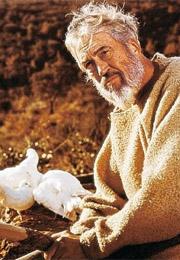John Huston concludes his film, The Bible: In the Beginning (1966), with Abraham’s near-sacrifice of his son Isaac and God’s promise of countless future generations in return for his faithfulness. In the film (not in scripture), God tells Abraham that he has been tried like metal in a fire. Viewers of Huston’s sprawling biblical epic might feel the same way at the conclusion of this almost three hour long film, though with little formation or insight to show for it.
Producer Dino De Laurentiis originally wanted to create a ten hour long production that would feature highlights from both the Old and New Testaments over three separate screenings. De Laurentiis had his eye on both Orson Welles and Charlie Chaplin to direct. All he managed to get was the first twenty-two chapters of Genesis which make up the Huston directed The Bible: In the Beginning.
Of course, we do not see every single event of the first twenty-two chapters, but Huston films, narrates, and stars in the major stories. We begin at the beginning with the creation of the world, Adam and Eve’s fall, their expulsion, Cain’s murder of Abel, Noah’s Ark, Nimrod and the Tower of Babel, and the story of Abraham, Sarah, Hagar, Ishmael, and Isaac. Throughout these stories, Huston plays several roles: he is both the voice of God throughout and the voice of the tempter in the Garden of Eden. He also takes on the role of Noah in the spectacular flood sequence. Richard Harris hams it up as Cain while George C. Scott and Ava Gardner (perfectly cast) play Abraham and Sarah. Legendary actor Peter O’Toole plays the Angel(s) of the Lord in a bit of interesting staging. The angel is in fact three hooded figures, and throughout his time on screen, O’Toole peers out of one of the three hoods at any given time.
 I will not recount the plot here as it is so well-known. Huston films the events in a rather straightforward way; however, numerous problems abound and complicate this style. I am left wondering, yet again, why competent, even outstanding, filmmakers are rendered almost totally incompetent by biblical/religious subject matter. First, Huston’s film is just too long. I wondered if another filmmaker could not have shot much more of the Old Testament in these 174 minutes. Huston frequently includes shots and sequences for each story that are simply not necessary and do not advance the plot or offer any particularly insightful additions. Of note here is the insufferable amount of time that we spend in the Ark with Noah and his family. The fifteen to twenty minutes actually feels like forty days and forty nights. With so many other stories to tell, this is not a good thing.
I will not recount the plot here as it is so well-known. Huston films the events in a rather straightforward way; however, numerous problems abound and complicate this style. I am left wondering, yet again, why competent, even outstanding, filmmakers are rendered almost totally incompetent by biblical/religious subject matter. First, Huston’s film is just too long. I wondered if another filmmaker could not have shot much more of the Old Testament in these 174 minutes. Huston frequently includes shots and sequences for each story that are simply not necessary and do not advance the plot or offer any particularly insightful additions. Of note here is the insufferable amount of time that we spend in the Ark with Noah and his family. The fifteen to twenty minutes actually feels like forty days and forty nights. With so many other stories to tell, this is not a good thing.
Secondly, the score is completely overblown and, frequently, incompatible with the events on the screen. I will never for the life of me understand why it received a Best Musical Score nomination at the Academy Awards. The score either distracts form the events being presented or trivializes them. Third, Huston’s attempts at humor, especially in his turn as Noah, usually fall flat. The loading of the Ark becomes something akin to a Disney film which betrays the more somber tone of the rest of the film.
Of course, all 174 minutes cannot be all bad. Though also too long, the temptation of Eve sequence evidences some thought on the part of the filmmakers. Though they are not courageous enough to show us their idea in full light, they provide a silhouette of Eve’s tempter, complete with arms and legs, the physical preface to God’s curse and commandment that he should henceforth crawl on his belly. The building of the Ark is also quite clever and visually stunning, even if the subsequent proportions seem totally out of whack.
The Bible: In the Beginning is manageable in stages. As a whole, it unfortunately does not reflect the greatness of its director who gave us such films as The Maltese Falcon (1941), The Treasure of the Sierra Madre (1948), Key Largo (1948), The African Queen (1951), and The Misfits (1961). Neither does it reveal the greatness of God which it seeks to purport.











